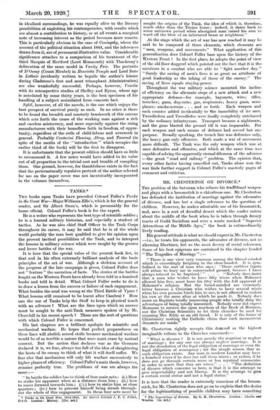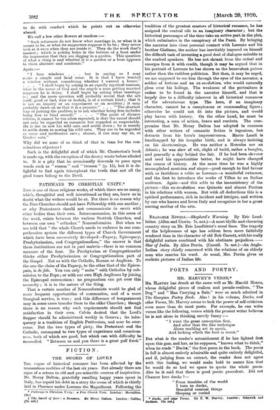MR. CHESTERTON ON DIVORCE.* Tire position of the batsman who
refuses his traditional weapon and plays with a broomstick is a chivalrous one. Mr. Chesterton has defended the institution of marriage against the advocates of divorce, and has but a single reference to the question of children. However, he makes admirable use of his broomstick, and, save in a sort of dreadful desert which the reader enters about the middle of the book when he is taken through dreary tracts of Guild Socialism and over a waste marked " Superior Attractions of the Middle Ages," the book is extraordinarily lively reading.
His general attitude is what we should expect in Mr. Chesterton —i.e., he treats his opponents, the advocates of divorce, not as alarming libertines, but as the most dreary of social reformers. Some of his best epigrams are contained in the chapter headed " The Tragedies of Marriage " :-
" There is one view very common among the liberal-minded which is exceedingly fatiguing to the clear-headed. It is sym- bolized in the sort of man who says : These ruthless bigots will refuse to bury me in consecrated ground, because I have always refused to be baptized.' " . . . 4•Nobody does insist that a man who -wishes to have fifty wives when Mehemet allowed him five, must have his fifty with the full approval of Mahomet's religion. But the broad-minded are extremely bitter because a Christian who wishes to have several wives when his own promise binds him to one, is not allowed to violate his vow at the same altar at which he made it. Nobody does insist on Baptists totally immersing people who totally deny the advantages of being totally immersed. Nobody ever did expect Mormons to receive the open mockers of the Book of Mormon, nor the Christian Scientists to let their churches be used for exposing Mrs. Eddy as an old fraud. It is only of the forms of Christianity making the Catholic claim that such inconsistent demands are made."
Mr. Chesterton rightly accepts this demand as the highest imaginable tribute to the Churches concerned:— "What is divorce ? It is not merely the negation or neglect of marriage ; for any one can always neglect marriage. It is not the dissolution of the legal obligation of marriage or even the legal obligation of monogamy ; for the simple reason that nc such obligation exists. Any man in modern London may have a hundred wives if he does not call them wives ; or rather, if he does not go through certain more or less mystical ceremonies in order to assert that they are wives." . . . "The definition of divorce which concerns us here, is that it is the attempt to give respectability and not liberty. It is the attempt to give a certain social status and not a legal status."
It is here that the reader is extremely conscious of the broom- stick, for Mr. Chesterton does not go on to explain that the desire for the legitimatizing of possible children may have something
• The Superstition of Divorce. By 0. K. Chesterton. London : Mato and Matins. lbs. net.)
to do with conduct which he points out as otherwise absurd.
We cull a few other flowers at random :-
"Such reformers do not know what marriage is, or what it is meant to be, or what its supporters suppose it to be ; they never look at it even when they are inside it. They do the work that's nearest ; which is poking holes in the bottom of a boat under the impression that they are digging in a garden. This question of what a thing is and whether it is a garden or a boat appears to them abstract and academic."
Again :— " I love windows . . . but in saying so I may make a simple and fatal error. It is that I have wanted a window without considering whether I wanted a house." . . . " I shall begin by asking in an equally mystical manner, what in the name of God and the angels a man getting married supposes he is doing. I shall begin by asking what marriage is ; and the mere question will probably reveal that the act itself, good or bad, wise or foolish, is of a certain kind ; that it is not an inquiry or an experiment or an accident ; it may probably dawn on us that it is a promise." . . . " The shortest way of putting the problem is to ask whether being free includes being free to bind oneself." . . . " The point of divorce reform, it cannot be too often repeated, is that the rascal should not only be regarded as romantic but regarded as respectable. He is not to sow his wild oats and settle down ; he is merely to settle down to sowing his wild oats. They are to be regarded as tame and inoffensive oats ; almost, if one may say so, as Quaker oats."
Why did we none of us think of that in time for the con- scientious objectors !
Such is the delightful stuff of which Mr. Chesterton's book is made up, with the exception of the dreary waste before alluded to. It is a pity that he occasionally descends to puns upon words such as " reason " and " treason " (p. 15), but it is de- lightful to find again triumphant the truth that not all the good tunes belong to the Devil.





































 Previous page
Previous page